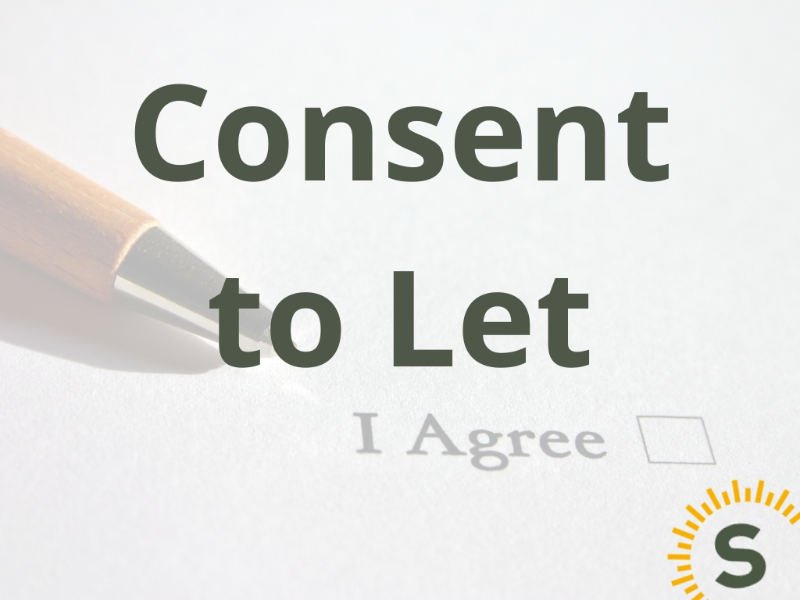
Renting out your property can be a great way to generate income and make the most of your investment. However, if you have a residential mortgage, it's important to obtain consent to let from your mortgage lender before proceeding.
In this insight, we'll explore all things consent to let, providing you with the information you need to navigate this process with confidence.
Consent to let is a written formal agreement between you, the homeowner, and your mortgage lender that allows you to rent out your property while keeping your existing residential mortgage in place.
It is a temporary arrangement that grants you permission to become a landlord without the need to switch to a buy-to-let mortgage.
Residential mortgages are designed for homeowners who intend to live in the property they purchase. Renting out your property without obtaining consent to let would put you in breach of your mortgage terms and could result in financial penalties or even repossession. Consent to let ensures that you comply with your mortgage agreement while still being able to generate rental income.
If you let your property out without consent, you are technically committing mortgage fraud,
There are various situations where applying for consent to let is advisable. Here are a few common scenarios:
If you need to move away for a short period due to work, travel, or caring for a relative, obtaining consent to let can provide you with the flexibility to rent out your home while you're away.
If you're in the process of selling your home but haven't found a buyer yet, consent to let allows you to rent out the property while you wait for a sale. Another option would be to consider a bridging loan.
If you're planning to switch to a buy-to-let mortgage but haven't completed the process yet, obtaining consent to let can bridge the gap and enable you to start renting out your property.
If you're locked into a fixed-term mortgage but need to move or rent out your property before the term ends, consent to let can provide a solution without incurring early repayment charges.
The process of applying for consent to let varies depending on the lender. However, there are some general steps you can follow:
Get in touch with your mortgage lender to express your intention to rent out your property temporarily. This can usually be done by phone, online application, or by downloading and completing an application form.
Your lender may require supporting documents such as proof of your reason for letting, tenancy agreements, travel documents, or employment contracts. Be prepared to provide any necessary documentation to support your application.
Some lenders charge fees for granting consent to let. These can vary and may be a one-time flat fee or an increase in your interest rate. Confirm the fees with your lender and be prepared to pay them if applicable. For example, Lloyds bank add an additional 0.5% to your mortgage interest rate during the time that you have consent to let.
Once you've submitted your application and supporting documents, you'll need to wait for your lender's decision. The timeframe for approval can vary, so it's important to plan ahead and apply in advance of your intended rental start date.
Each lender has its own eligibility criteria for granting consent to let. While these criteria may vary, here are some common factors lenders consider:
Lenders typically look at your mortgage payment history to assess your financial responsibility. If you have a history of missed payments or arrears, it may impact your eligibility for consent to let.
Lenders may require a minimum level of equity in your property, typically around 25%, to grant consent to let. Additionally, they may consider the loan-to-value ratio to determine the risk associated with the arrangement.
Some lenders require you to have been with them for a minimum period, usually between 6 to 12 months, before granting consent to let.
Lenders may assess your income to ensure that the rental income from your property is sufficient to cover your mortgage payments. They may also have minimum income requirements for granting consent to let.
Certain types of mortgages, such as Help to Buy or Shared Ownership, may have restrictions on letting out the property. Leasehold properties may also require additional consent from the freeholder or managing agent.
It's important to note that meeting the eligibility criteria does not guarantee approval, as each application is assessed on a case-by-case basis.
Obtaining consent to let can offer several advantages for homeowners who need to rent out their property temporarily:
While consent to let offers flexibility and benefits, it's important to consider the potential drawbacks:
Consent to let agreements have a specified duration, typically ranging from 6 to 24 months, depending on the lender. When the consent period comes to an end, you have several options:
If you wish to continue renting out your property, contact your lender to discuss extending the consent period or explore the possibility of switching to a buy-to-let mortgage.
If you have enjoyed being a landlord and want to continue renting out your property, you may decide to switch to a buy-to-let mortgage. This would involve remortgaging your property under different terms and conditions. For more information on how Buy to Let differs from Consent to Let, read our insight: Is Consent to Let Better than Buy-To-Let?
Before making a decision, it's essential to consider the current market conditions, rental demand, and your long-term goals to determine the most suitable course of action.
Obtaining consent to let on a leasehold property may require additional steps. In addition to obtaining consent from your mortgage lender, you may need to seek permission from the freeholder or managing agent responsible for the leasehold property. Leasehold agreements often have specific clauses relating to subletting, so it's essential to review your lease agreement and consult with the relevant parties before proceeding.
Consent to let is a valuable option for homeowners who need to rent out their property temporarily while keeping their residential mortgage in place. By obtaining consent to let, you can generate rental income, maintain the flexibility to adapt to changing circumstances, and test the waters of becoming a landlord. However, it's essential to carefully consider the advantages and disadvantages, meet the eligibility criteria, and follow the necessary steps to ensure a smooth and legal rental process.
Remember to consult with your mortgage lender, review your mortgage agreement, and seek any additional permissions required for leasehold properties. With the right approach, consent to let can be a beneficial arrangement that allows you to make the most of your property investment while complying with your mortgage terms.

Stuart is an expert in Property, Money, Banking & Finance, having worked in retail and investment banking for 10+ years before founding Sunny Avenue. Stuart has spent his career studying finance. He holds qualifications in financial studies, mortgage advice & practice, banking operations, dealing & financial markets, derivatives, securities & investments.
 No minimum
No minimum  Newcastle-under-Lyme, Staffordshire
Newcastle-under-Lyme, Staffordshire Free Consultations
Free Consultations
 No minimum
No minimum  No obligation consultation
No obligation consultation
 No minimum
No minimum  No obligation consultation
No obligation consultation
 No minimum
No minimum  Free Consultations
Free Consultations
 No minimum
No minimum  No obligation consultation
No obligation consultation
 No minimum
No minimum  No obligation consultation
No obligation consultation
 No minimum
No minimum  Free Consultations
Free Consultations
 No minimum
No minimum  Coatbridge, Lanarkshire
Coatbridge, Lanarkshire Initial or Ongoing Consultation Fees
Initial or Ongoing Consultation Fees
 No minimum
No minimum  Initial or Ongoing Consultation Fees
Initial or Ongoing Consultation Fees
 £21,000 +
£21,000 +  Initial fee free consultation
Initial fee free consultation
 London, Greater London
London, Greater London No obligation consultation
No obligation consultation
 No minimum
No minimum  No obligation consultation
No obligation consultation
 No minimum
No minimum  Initial fee free consultation
Initial fee free consultation
 No minimum
No minimum  No obligation consultation
No obligation consultation
 No minimum
No minimum  No obligation consultation
No obligation consultation
 No minimum
No minimum  No obligation consultation
No obligation consultation
 No minimum
No minimum  Initial fee free consultation
Initial fee free consultation
 No minimum
No minimum  No obligation consultation
No obligation consultation
 No minimum
No minimum  Initial fee free consultation
Initial fee free consultation
 £101,000+
£101,000+  Bishop's Stortford, Hertfordshire
Bishop's Stortford, Hertfordshire No obligation consultation
No obligation consultation
 No minimum
No minimum  Derry / Londonderry, County Derry / Londonderry
Derry / Londonderry, County Derry / Londonderry Free Consultations
Free Consultations
 No minimum
No minimum  Stockton-on-Tees, County Durham
Stockton-on-Tees, County Durham Free Consultations
Free Consultations
 No minimum
No minimum  Initial fee free consultation
Initial fee free consultation
 No minimum
No minimum  Cheltenham, Gloucestershire
Cheltenham, Gloucestershire No obligation consultation
No obligation consultation
 No minimum
No minimum  Free Consultations
Free Consultations





Our website offers information about financial products such as investing, savings, equity release, mortgages, and insurance. None of the information on Sunny Avenue constitutes personal advice. Sunny Avenue does not offer any of these services directly and we only act as a directory service to connect you to the experts. If you require further information to proceed you will need to request advice, for example from the financial advisers listed. If you decide to invest, read the important investment notes provided first, decide how to proceed on your own basis, and remember that investments can go up and down in value, so you could get back less than you put in.
Think carefully before securing debts against your home. A mortgage is a loan secured on your home, which you could lose if you do not keep up your mortgage payments. Check that any mortgage will meet your needs if you want to move or sell your home or you want your family to inherit it. If you are in any doubt, seek independent advice.